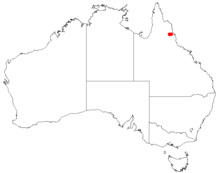Homoranthus clarksonii
Homoranthus clarksonii is a plant in the myrtle family Myrtaceae and is endemic to a small area in Queensland. It is an upright shrub with pointed, linear leaves and pairs of creamy pink to pale yellow flowers which turn pink as they age. It is only known from small populations on Mount Mulligan.[2]
| Homoranthus clarksonii | |
|---|---|
| Scientific classification | |
| Kingdom: | Plantae |
| Clade: | Tracheophytes |
| Clade: | Angiosperms |
| Clade: | Eudicots |
| Clade: | Rosids |
| Order: | Myrtales |
| Family: | Myrtaceae |
| Genus: | Homoranthus |
| Species: | H. clarksonii |
| Binomial name | |
| Homoranthus clarksonii | |
 | |
| Occurrence data from AVH | |
Description
Flowers sporadically throughout the year, peak flowering from March to May. [3]
Taxonomy and naming
Homoranthus clarksonii was first formally described in 2011 by Lachlan Copeland, Lyndley Craven and Jeremy Bruhl from a specimen collected on Mount Mulligan in 2001 and the description was published in Australian Systematic Botany.[4] The specific epithet (clarksonii) honours John Richard Clarkson who discovered the species.[2]
Distribution and habitat
Restricted the north western edge of Atherton Tablelands west of Mareeba. H. clarksonii grow in shallow, sandy soils amongst sandstone boulders.[3]
Conservation status
Apparently restricted to Mount Mulligan. A ROTAP conservation code of 2V following Briggs and Leigh (1996). IUCN (2010) vulnerable.[3]
References
- "Homoranthus clarksonii". World Checklist of Selected Plant Families (WCSP). Royal Botanic Gardens, Kew.
- Copeland, Lachlan M.; Craven, Lyn A.; Bruhl, Jeremy J. (2011). "A taxonomic review of Homoranthus (Myrtaceae:Chamelaucieae)". Australian Systematic Botany. 24 (6): 370. doi:10.1071/SB11015.
- Copeland, Lachlan M.; Craven, Lyn A.; Bruhl, Jeremy J. (2011). "A taxonomic review of Homoranthus (Myrtaceae: Chamelaucieae)". Australian Systematic Botany. 24 (6): 351. doi:10.1071/SB11015.
- "Homoranthus brevistylis". APNI. Retrieved 23 August 2018.